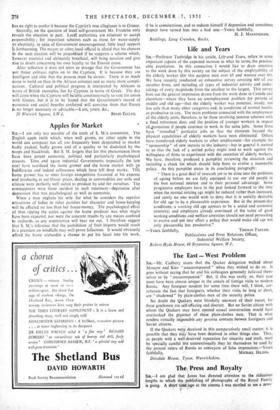Apples for Market
am only too sensible of the truth of S. M.'s contention. The English apple (with which, when well grown, no other apple in the world can compare) has all too frequently been despatched to market badly packed, badly grown and of a quality to be disdained by the !wasps and blackbirds. But S. M. forgets that for this phenomenon there have been potent economic, political and particularly psychological reasons. Time and again industrial Governments (especially the late one) have sacrificed the home grower and the home market with an Indifference and indeed callousness which have left deep marks. This home grower has to meet foreign competition favoured at his expense and producing at cut-throat prices, dealing in commodities our soils and climate were perfectly well suited to produce by and for ourselves. The consequences were those incident to such treatment—depression after depression that was psychological as well as economic.
When a man neglects his wife for what be considers the superior attractions of ladies in other parishes her character and house-keeping Will be affected no less than her house-money. The psychological effect of thus tipping the scales against the home producer was what might have been expected, nor were the concrete results by any means confined )to orchards, as any countryman will bear me out. I therefore suggest that S. M.'s inference that the prohibition of fruit imports would result In a premium on windfalls may well prove fallacious. It would obviously afford the home orchardist a chance to put his heart into his work, if he is conscientious, and to redeem himself if depression and sometimes deamir have turned him into a bad one.—Yours faithfully, Reddings, Long Crendon, Bucks. H. J. MASS1NGHAM.


















































 Previous page
Previous page